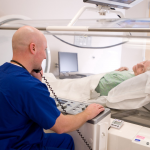
By Dr. Haley Vo, Mercy physician and mama of 3
While I was in medical school, the sister of one of my friends was in a car accident. She picked up her medical records from her ER visit to bring to her insurance adjuster. As she rifled through them, she was very offended when she noticed that the first line of her physical exam said, “Well nourished, well developed.” She was mortified that the ER doctor had commented on her bra size!
After I quit laughing, I tried, best I could, to explain that this didn’t have anything to do with her chest. That’s simply the medical way of saying that she had a normal physique. I realized, then, that sometimes medical professionals use words that have completely different meanings to the general public. Here’s a list of words that I encounter nearly everyday that are sometimes hard to explain. I’ll do the best I can, so that next time you see your medical records you don’t panic about your cup size.
URI. This stands for upper respiratory infection. It encompasses a lot of things including runny nose, sore throat, congestion, cough. This is usually viral in nature, though it doesn’t have to be.
Gastroenteritis: Gastro = stomach, enter = intestines, itis = infection. Put them all together and you’ve got nausea, vomiting, diarrhea, or some combination there of, often caused by a virus as well. This is a very scary word in my house!
CT scan: A special xray that allows us to see the insides of people. It used to be called a CAT scan, but the images are able to be produced slightly differently now than they used to be, so the “A” has been dropped.
MRI: Magnetic resonance imaging. This is another special radiology test that is produced by a high-powered magnet. It’s really good at visualizing muscles, cartilages, nerves, and fine details of the brain.
Echo: Short for echocardiogram, an ultrasound of the heart. This test allows us to see how the heart is beating, how the heart valves are working, and the overall structure of the heart.
CABG: We pronounce this as “cabbage.” It’s not what we eat for lunch! A CABG is a heart bypass surgery.
Diverticulitis: This one gets a little complicated. It’s an infection of the large intestine, caused by small pouches that have developed in the wall of the intestine. This is not to be confused with diverticuLOSIS, which is a condition where the pouches are developed, but there is no infection present.
Pyelonephritis: A kidney infection. This is a little more complicated than cystitis, which is infection of the bladder.
Sepsis: Sepsis is a syndrome, associated with a big infection, that encompasses dysfunction of many of your organ systems. It is very serious and often fatal.
Here’s another nomenclature system that you may see and wonder what it means: Doctors use the abbreviation G and P to talk about a woman’s obstetrical history. The G is the number of times a woman has been pregnant, and the P is the number of births a woman has had. So, if you have been pregnant 2 times and had 2 deliveries, then you would be a G2P2.
Easy, right? With these definitions in mind, medical jargon won’t feel like a foreign language. Hope it makes your next doctor’s visit a little more enjoyable and a little less intimidating.
To visit with Dr. Vo in person, you can schedule an appointment with her by calling the Mercy Clinic Primary Care Sugar Creek in Bella Vista. It’s located at 24 Sugar Creek Center and the phone number is 479-876-1414. Same day appointments are available at the clinic.
If you have a general health question for Dr. Vo, you can email it to mamas@nwaMotherlode.com and she may answer it in a future post.








This is great information!
Does she have a blog? I would totally follow it!
Thanks,
Janeal